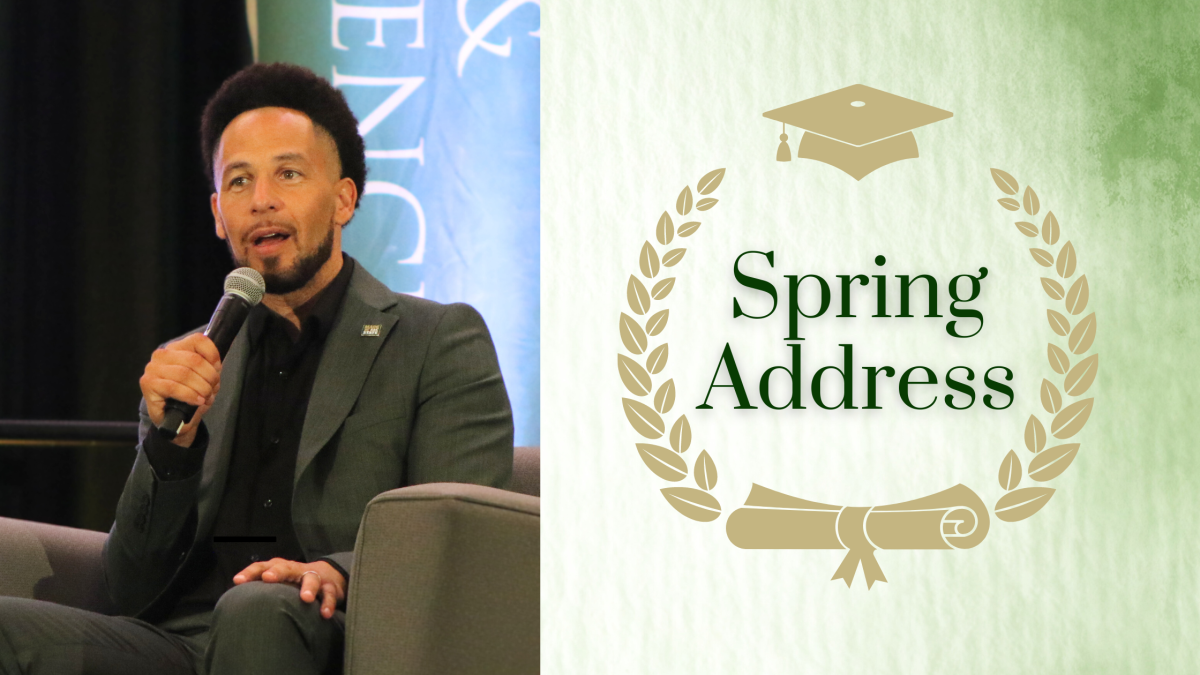Sacramento State President Luke Wood delivered his spring address Thursday morning in the University Union Ballroom.
Wood revealed the results of his “100 days of listening” campaign and outlined his priorities and goals. His administration has a list of 23 “action items” to address the challenges that were identified during his 92 listening sessions.
Some initiatives Wood discussed include increasing enrollment, the effects of the state budget shortfall on the university’s operations, improving scholarship utilization and improving academic advising.
RELATED: How to navigate classes during Sac State’s CFA Strike
He proposed combining smaller departments where there are areas of “shared purpose” to create larger divisions. Wood said that demanding workloads created stress for staff and the university needs to “demonstrate care to our employees.”
The address was focused on staff retention, recognition, quality of life and recruitment.
Wood also spoke about the CapRadio news and said he had “come into it after the Titanic had already hit the iceberg.”
Wood said the CapRadio Board of Directors is going to be reconstituted at its next meeting. He also said the National Public Radio contract with CapRadio has been extended through 2028.
He spoke about the growth he hoped to see in future enrollment both generally and for underrepresented populations, including African American and Indigenous students.
“We have the capacity to take more students,” Wood said. “We are creating more opportunities for access to higher education and greater upward social mobility for students and their families.”
Wood said this is “the best future” Sac State could have. He spoke about what makes Sac State special and how it is one of the “best kept secrets” in the California State University system.
“When you walk on this campus you see the beauty of what this world should be,” Wood said. “It is a distinctive feature of our campus, we are a campus that is focused on justice, equity, inclusion and belonging.”
Wood also introduced the goal of establishing a Black honors college by fall 2024 in line with the Chancellor’s Black Student Success recommendations to serve students interested in Black and African American life, history and culture.
He addressed the need to increase graduation rates and challenged the idea that student success should be measured by graduation rates.
Department Chair and Associate Professor of Humanities and Religious Studies Harvey Stark was supportive of Wood’s agenda.
“It showed the resilience of his leadership,” Stark said. “I think the most important thing is that he’s listening, observing what people are telling him.”
California Faculty Association Chapter Treasurer and political science professor Monicka Tutschka said she thought Wood had heard the complaints of the striking employees and would use his influence in meetings with CSU Chancellor Mildred Garcia.
“I respect what he’s doing and I’m very pleased that he’s willing to share what our concerns are with the chancellor,” Tutschka said.
Wood concluded by identifying six staff members who were mentioned repeatedly during the listening sessions as doing excellent work in the course of their duties. He presented them gift bags and plaques that read “President’s Award for Excellence” on stage.
Senior Student Support Counselor Noelle McCurley, who received an award said she felt honored by the recognition.
“I love what I do. It is nice to hear that other people recognize that,” McCurley said. “I feel very touched, very honored and very special.”
The other five recipients for the award include Charles Cole, Scott Oleinik, Erik Ramirez, Annette Reed and Mariappan “Jawa” Jawaharlal.
Wood finished his address by acknowledging the upcoming strike and said things next week are going to look different. He then thanked the staff for the environment they create on campus and what they do for Sac State.
“You’re not just a number, but you’re a name and a future,” Wood said. “We have a family of educators here that is committed to transforming the lives of our students, their families and improving the region.”
























































































































